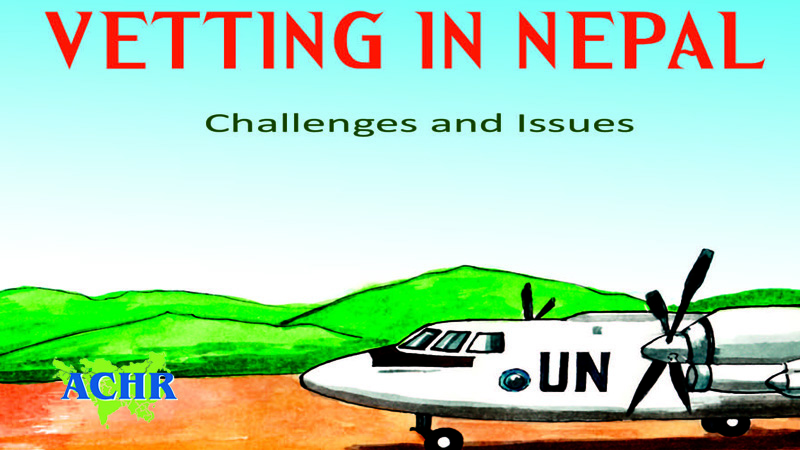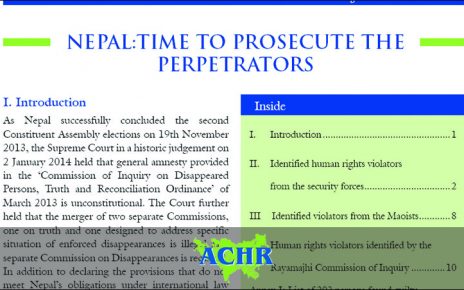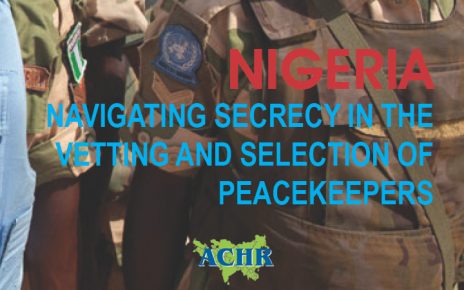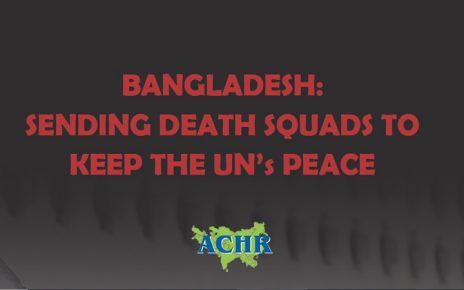Over the last few years, there have been several high profile cases where the United Nations (UN) Department of Peacekeeping Operations (DPKO) has ordered the return of Nepali peacekeepers after it became known that there was prima facie evidence of their involvement in serious human rights violations in Nepal.
Two of the most emblematic cases were that of Captain Niranjan Basnet of the Nepal Army (NA) and Deputy Superintendent of Police (DSP) Basanta Kunwar. Captain Basnet was one of those accused in September 2009 of the murder of Maina Sunuwar. Despite the fact that the case was pending before the Kavre District Court, Captain Basnet was sent on a peacekeeping mission to Chad in 2009. Similarly, DSP Kunwar had a case pending against him under the Compensation Relating to Torture Act 2053 (1996) (CRT) in the Kathmandu District Court, when he was sent on a peacekeeping mission to Liberia in August 2011. Both were repatriated once the information concerning their violations came to light.
In early 2013, Nepal Army (NA) Colonel Kumar Lama was serving as an expert on a UN mission in South Sudan when he was arrested during a visit to the United Kingdom (UK) under universal jurisdiction powers. He has been charged with two counts of torture relating to the armed conflict period and remains in the UK where he is now awaiting trial. It is clear from these and other examples that the current system for the selection of peacekeepers in Nepal is in dire need of reform.
On 23 January 2013, the Government announced new Army Service Regulations (ASRs). These followed in the wake of an August 2012 order by the Supreme Court of Nepal (SC) for the Government to establish vetting laws to regulate the recruitment, promotion and transfer of government officials, including those from the security services. The SC directed the Government to follow Article 126 (5) of the Interim Constitution of Nepal (IC) which expressly provides that the Public Service Commission (PSC) be consulted in matters of promotion and other issues involving government officials.
The ASRs also followed the introduction of a UN policy for the human rights screening of UN peacekeeping personnel (adopted in December 2012). This policy was communicated to troop and police contributing countries (TCCs and PCCs) in 2013 with a request that they put in place the necessary systems to uphold the new policy.
While the NA’s increasing transparency in relation to recruitment and promotion of personnel is welcome, it remains a shame that the NA’s internal Directives for Selection of Peacekeepers (2008) were never made public and that the selection of peacekeepers is still handled as an internal affairs. However, the new ASRs have set basic guidelines for the selection of peacekeepers and committed that the Ministry of Defence would formulate and implement a detailed policy for selection of peacekeepers. As of early 2014, the ministry was yet to start the process of drafting the selection procedure. With the introduction of the ASRs, the basic selection criteria of peacekeepers are now public; however, the selection process is as yet not very transparent. In contrast to the NA, the Nepal Police (NP) and the Armed Police Force (APF) are more transparency in their decision making processes for the selection of peacekeepers; however human rights and gender issues need to be incorporated more clearly into these policies.
This report will present and analyze the current policies and practices for the recruitment and promotion of security forces personnel into the Nepal Army (NA), Nepal Police (NP) and Armed Police Force (APF). It will further examine how each of the institutions currently recruits and select personnel for UN peacekeeping duties overseas. It will also set out the role of the various oversight mechanisms in place in Nepal and what actions the Nepal Government, the NA, NP and APF have taken in response to their human rights-related recommendations.5 It briefly touches on the mandate of the Truth and Reconciliation Commission and the Commission on Enforced Disappearances as set out in a new Act adopted in April 2014. The Act does not set out any powers for the commissions to consider the vetting for public office of those whom it finds to have been involved in serious human rights violations.It remains to be seen whether the commissions will consider the issue of vetting.
It is hoped that this report will assist the Nepal authorities in the implementation of the SC’s decision and uphold its responsibilities under the UN Charter (1945) by putting in place transparent systems of appointment and promotion for security forces personnel and their selection for peacekeeping duties, excluding anyone against whom there is credible evidence of their involvement in serious violations of international human rights or humanitarian law.
View Full Report




